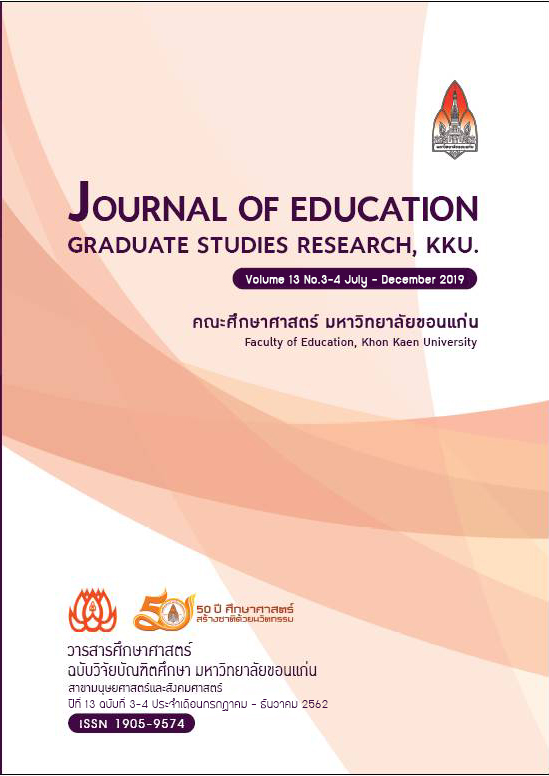The Ability to Learn and Persist in Learning about the Number of Intellectually Impaired Individuals Using Games Model and Rehearsals
Main Article Content
Abstract
The purpose of this study was to determine of ability and retention on the counting number for students with intellectual disabilities by using games model and skill exercises who are in Prathom 6 in Chaiyaphum school for the deaf first semester in 2018. Moreover, the target group used in this study was five intellectually disabled students at the level of learning aged between 11 to 15 years old with mathematical problems in numerical values.
The research instruments consisted of 1) 8 lesson plans involving the students with intellectual disabilities using 8 types of learning games 2) 8 exercises about counting from 1-10 related to lesson plans and 3) learning management test. Counting matter: It is a picture matching test with numbers and 2 sets of number writing, 10 items each.
The study found that after using the game model. Together with the math skills training series the number of students with intellectual disabilities, grade 6, in the target group had higher average scores after learning. The average pre-learning 5.6, and after 17.4. Learners can maintain learning outcomes after learning new things, even leaving them for a while. The ability and persistence in the numerical learning of students with intellectual disabilities, using learning management, game models and competition with skill set had a 96.5% improvement.
Article Details
References
แก้วตา บุปผเวส. (2548). ความคงทนในการจำคำศัพท์ของเด็กออทิสติก ระดับอนุบาล. จากการฝึกโดยใช้กิจกรรมเกม. ปริญญานิพนธ์การศึกษามหาบัณฑิต สาขาวิชาการศึกษาพิเศษ บัณฑิตวิทยาลัย มหาวิทยาลัยศรีนครินทรวิโรฒ.
ดารณี ธนภูมิ. (2546). การเรียนรู้ของเด็กปัญญาอ่อน. กรุงเทพฯ: กองโรงพยาบาลราชานุกูลกรมสุขภาพจิต ระทรวงสาธารณสุข.
ทิศนา แขมณี. (2550). ศาสตร์การสอน: องค์ความรู้เพื่อการจัดกระบวนการเรียนรู้ที่มีประสิทธิภาพ.พิมพ์ครั้งที่ 4. กรุงเทพฯ: จุฬาลงกรณ์มหาวิทยาลัย.
ปรียาพร วงศ์อนุตรโรจน์. (2551). จิตวิทยาการศึกษา. กรุงเทพฯ: พิมพ์ดี.
พรเพ็ญ ศรีวิรัตน์. (2546). การคิดอย่างมีวิจารญาณของเด็กปฐมวัยที่ได้รับการเล่นเกมฝึกทักษะการคิด. วิทยานิพนธ์ปริญญาการศึกษามหาบัณฑิต สาขาวิชาการศึกษาปฐมวัย บัณฑิตวิทยาลัย มหาวิทยาลัยศรีนครินทรวิโรฒ.
ละออ ทองดีนอก. (2554). การศึกษาความสามารถการรู้ค่าจานวน 1-10 ของเด็กที่มีความบกพร่องทางสติปัญญาโดยการใช้เกม.
การศึกษาคนคว้าอิสระปริญญาการศึกษามหาบัณฑิต สาขาวิชาหลักสูตรและการสอน บัณฑิตวิทยาลัย มหาวิทยาลัยมหาสารคาม.
บุญธรรม กิจปรีดาบริสุทธิ์. (2551). สถิติวิเคราะห์เพื่อการวิจัย. กรุงเทพฯ: จามจุรีโปรดักส์.
วารี ถิระจิตร. (2541). การศึกษาสำหรับเด็กพิเศษ. พิมพ์ครั้งที่ 2. กรุงเทพฯ: จุฬาลงกรณ์มหาวิทยาลัย. กรุงเทพฯ: ไทยวัฒนาพานิช.
สุนีย์ เพียซ้าย. (2540). กิจกรรมคณิตศาสตร์สาหรับปฐมวัย. กรุงเทพฯ: สถาบันราชภัฏสวนดุสิต.
สํานักงานสถิติแห่งชาติ. (2555). การสํารวจการใช้เครื่องมือ/อุปกรณ์เทคโนโลยีสารสนเทศ พ.ศ. 2554. กรุงเทพฯ: สํานักงานสถิติแห่งชาติ.
โสภณ บำรุงสงฆ์. (2540). เทคนิคและวิธีสอนคณิตศาสตร์แนวใหม่. กรุงเทพฯ: ไทยวัฒนาพานิช.
อรอนงค์ คัดทะจันทร์. (2559). ผลการใช้เกมการศึกษาในการพัฒนาความสามารถทางการบวกและการลบจำนวนที่มีผลลัพธ์และตัวตั้งไม่เกิน 20 ของนักเรียนที่มีความบกพร่องทางร่างกายหรือการเคลื่อนไหว ชั้นประถมศึกษาปีที่ 1. วิทยานิพนธ์ปริญญาศึกษาศาสตรมหาบัณฑิต สาขาวิชาหลักสูตรและการสอนการศึกษาพิเศษ บัณฑิตวิทยาลัย มหาวิทยาลัยขอนแก่น.

